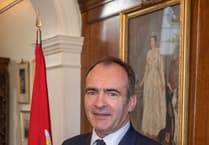Does being a government minister damage your chances at the polling station?
That’s the question being asked by politicians and observers in the light of last week’s election, which saw four ministers rejected by voters.
Policy and Reform Minister Ray Harmer, Infrastructure Minister Tim Baker, Justice and Home Affairs Minister Graham Cregeen and Environment Minister Geoffrey Boot were all given their marching orders.
Only three ministers were returned: Alex Allinson, David Ashford and Alfred Cannan.
A former MHK and minister certainly believes one government department in particular is bad for your health.
Phil Gawne was Infrastructure Minister in 2010-11 and again 2015-16. He said: ’The first time I stood as Department of Infrastructure Minister (2011), at the election, people had not realised how bad the DoI was.
’I was returned as MHK but the second time around, it had become obvious that the DoI in its current formant was not fit for purpose - mainly due to the lack of budget.
’I am absolutely sure that is what did for Ray and Tim.’
Mr Harmer was Infrastructure Minister from 2016-20, when Mr Baker took over. Both were plagued with complaints about disruption and were dragged down by the political albatross of the promenade redevelopment.
Mr Gawne said the DoI’s officers were always ’skilled and capable’ but there was ’something seriously wrong’ with the department.
He added that last week’s results suggested there was a ’big disconnect’ between the government and the population.
Part of the blame for that, he argued, was a failure in communication.
A new pay structure has come in that sees MHKs’ basic salary increased significantly, and a halving of the pay gap between backbenchers and ministers. Would that cause a problem?
’I knew some MHKs, some former members who shall remain nameless, who took various roles in government purely because they wanted the money,’ said Mr Gawne.
But he said that was not true of most MHKs, who entered politics to make a difference and may well see being part of the government as the best route to do that.
Garff MHK Daphne Caine, a backbencher in the previous administration, does not think money will play a key role in MHKs deciding whether to accept a ministerial position.
’I think the ministerial battering at the ballot box was a reflection on their role in government and in their constituency,’ she said, pointing to the fact that Health Minister David Ashford topped the poll in Douglas North.
’Minister Ashford has always been unfailingly quick to respond to both constituency and health queries, which I think helped him receive the electorate’s support.
’It’s a cautionary tale for anyone considering a ministerial appointment, with the time commitment a serious question to consider to do the job well and still connect with your constituency. Perhaps we might see jobshare department roles in future to assist working parents?’
Mrs Caine added: ’I don’t believe the salary uplift is a consideration; everyone standing is motivated to serve the public as their main focus.
’We go into politics to try to shape the island we want to see in the future, so who wouldn’t be happy to contribute to that in the most effective, influential way possible?’
She welcomed the fact that those chairing standing scrutiny committees would receive the same pay as ministers.
Douglas Central MHK Chris Thomas was policy and reform minister in the Howard Quayle administration, until his sacking in June last year. He was re-elected on Thursday, although Ann Corlett, a backbencher throughout the five-year term, topped the poll.
Mr Thomas said: ’Only three serving ministers were returned this general election.
’I guess that might put some off accepting a ministerial offer, especially as the record shows an MHK can lead policy change from outside CoMin, as I did since my sacking in June 2020 regarding how to act to tackle our housing crisis, gas regulation, fair competition for dial-a-ride, telecoms mast sharing, access to buses, and use of Public Health law rather than emergency powers for Covid-19 for instance.
He added: ’Pay will matter for some politicians, but not for those MHKs who really care about getting the change and action that is needed.’
Mr Thomas said in 2020 four MHKs and four MLCs declined departmental roles, which would have cost each more than £10,000 per year.
’All but one of those who stood got re-elected by the public,’ he added. ’I think whether those principled public representatives will serve in CoMin will depend on the alignment of government’s collective and prioritised policy agenda with their individual manifestos and mandates.’
Last year, Tynwald members approved a major shake-up of their pay structure.
The changes mean MHKs’ basic pay is increasing from £43,479 plus £7,403.60 expenses up to a basic salary of £65,098 with no expenses.
MLCs will get a slightly lower base rate of £61,455, to reflect the difference in the two branches. Before now, the basic pay has been the same for both.
The plan was described as cost-neutral.
From now on, members will not receive separate expenses, with the figure incorporated into their salaries, meaning they will pay tax and NI on it.
More significantly, members who join departments will no longer receive a pay uplift. Previously they received 30% on top of their base rate, apart from Treasury, where the figure was 40%.
The new chief minister will receive 30% more than the MHK’s base rate on their salary. That take home pay of £84,627 is actually £1,000 less than the amount Howard Quayle was paid.
Ministers, Tynwald President and the Speaker will get 15% more than the base rate, equating to £74,863. That’s nearly £10,000 more than the previous pay of ministers, but the difference between ministers’ pay and the basic MHK rate will have dropped to below £10,000, compared with a gap of more than £21,000, previously.




